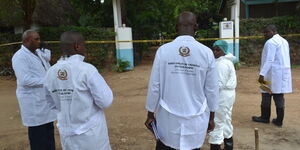The Kenya Association of Travel Agents (KATA) has petitioned the National Assembly opposing a proposed 16 per cent Value Added Tax (VAT) on select air services including air tickets supplied by travel agents.
Led by Chairman Joseph Kithitu and CEO Nicanor Sabula, KATA officials stated that the onslaught would affect not only the wealthy as the government speculated but also a growing number of middle-class Kenyans.
They termed the characterisation of air travel as a ‘luxury’ exclusively by the rich as old and misguided.
In Kenya’s modern economy, they outlined that air travel has grown to become a necessity for more Kenyans backed by facts like; an expanding middle class, the growth of domestic tourism, and the rise of affordable travel options.
Domestic air travel, for instance, has been facilitated by the cropping up of several domestic airlines offering cheap flights to and from Kenyan cities and towns.
The cheap prices have introduced an alternative for a diverse class of citizens travelling domestically whether for business, education, family obligations, or tourism.
“To assume that those flying between cities such as Nairobi, Eldoret, Kisumu, Lodwar, or Wajir are exclusively wealthy overlooks the reality that many travelers are professionals, small business owners, students, and even rural residents visiting family,” KATA opined.
If implemented, KATA expressed fears of an economic decline as it will most likely affect small and medium-sized businesses whose owners rely on quick flights to expand their reach and access opportunities.
To further drive their point home, KATA highlighted that bus or rail tickets for SGR were not taxed, cementing the fact that travel, of any nature was a necessity and not a luxury as implied in the tax policy change proposals.
“Air transport, just like other modes of transportation is a public service consumed by mwananchi (citizens) at a slightly higher price. It is for the same reason we don’t tax matatus or bus fares or even SGR fares,” KATA stated.
“Air travel may seem an unlikely target, but for a growing number of Kenyans, it’s a part of their livelihoods. Categorizing air travel as a “rich-only” service fails to recognise the real and growing need for accessible, affordable travel options.”
Despite these objections, however, KATA appreciated the government's efforts to provide tax relief on household essentials like unga and welcomed the government to make the same consideration on air travel as it had also grown to offer essential services to the common mwananchi.
"The Treasury’s move to offer tax relief on basic household essentials is welcomed and will greatly benefit Kenya’s lower-income households. But as Kenya’s economy evolves, so too should our perspectives on “luxury” versus “necessity," they stated.
"Air travel is today increasingly becoming a basic part of the fabric of Kenyan life, with significant benefits to local economies, small businesses, and personal well-being. Thoughtful tax policy should reflect this reality, balancing the need for revenue with the right to affordable travel for all."












